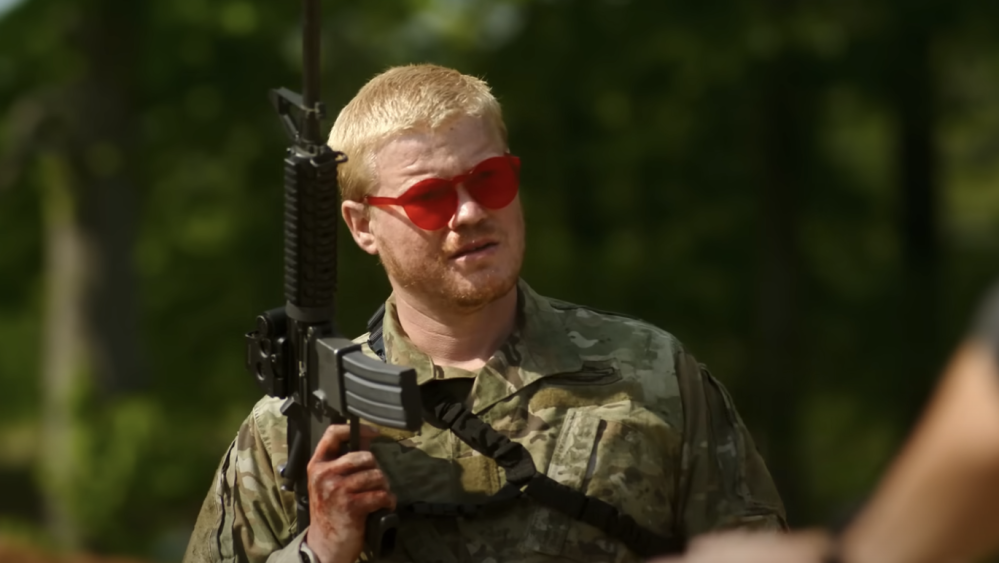Some thoughts on Civil War

Like a lot of viewers, I was initially confused and disappointed by A24’s Civil War, because I had brought a host of preconceptions with me. Some of these preconceptions were the product of the movie’s marketing, which made it seem like a war movie, which it is, but only tangentially. I had been warned that it was more about journalism than about our current political climate, but then I was confused even more because the journalists in the movie aren’t the kinds of journalists that are currently covering national politics. What it’s about is, specifically, combat journalism, the stripe of journalists who head toward explosions because that’s where the story is. In that way, it’s a close cousin of The Hurt Locker, insofar as it’s primarily about being an adrenaline junkie and what that does to a person’s soul.
I went to see it again last night, because enough people had been impressed by it that I wanted to go back and see it for what it is instead of what it is not. I found it much better the second time around because I could see the script more clearly and judge it for how well it does what it’s trying to do. What I realized is that the script’s model isn’t Battle of Algiers but Apocalypse Now.
(If you have not seen Battle of Algiers, see Battle of Algiers, one of the greatest movies ever made, about the Algerians throwing the French out of Algiers in 1957. The stunning immediacy of the movie and its documentary “realness” is thanks in part to shooting its key scenes in the actual locations where the battle happened, acted out by many of the people who had been there. It also co-stars Jean Martin as the French general in charge of putting down the Algerian rebellion. It is one of the only filmed performances of Martin, who originated the role of Lucky in Waiting for Godot.)
Like Apocalypse now, everything in Civil War is slightly overstated. It’s not that the movie isn’t lacking in subtlety or realism, but that the writer/director, Alex Garland, wants very much to make sure that everyone knows what’s going on. Also, like Apocalypse now, there is a certain florid, surreal edge to some of the staging of the action set pieces. Most of all, it’s like Apocalypse Now in that it’s not really about the war it’s about, but about a descent into moral chaos.
A number of folks have complained that the movie’s politics are too vague, that the movie doesn’t take sides or give us a road map to what’s going on. On a second viewing, I found I didn’t have a problem discerning the politics of the movie at all. There is a president who has somehow scored himself an illegal third term, disbanded the FBI, orders journalists shot on sight, and, most importantly, describes his own failures as amazing triumphs in the highest possible superlatives, so that he describes his doomed conflict as “some are already saying that this is the greatest victory in the history of military campaigns.” In other words, the president is Trump, and he has done what he’s said he would do: become a dictator.
That much is clear. What that has done to the country is a different story. Our journalist protagonists journey to the heart of darkness, as it were, through an increasingly surreal landscape of poorly defined conflicts, because, apparently, huge swaths of the United States in this movie have become chaotic free-fire zones where nobody knows anything, including who they’re supposed to be fighting. It’s like the entire movie is the Do Lung Bridge sequence in Apocalypse Now, where the protagonist of that movie asks a solider “Who’s in charge here?” and the soldier answers “Ain’t you?”
What seems to have happened in the United States, in this movie, is that, absent a strong federal government, certain areas of the country have turned into brutal fiefdoms where the only clear enemy is whoever is shooting at you at any given time. Looters are tortured, men in uniform shoot at men in civilian clothes and vice versa, and racists with guns round up and murder immigrants under no governance whatsoever.
All of that, it seems to me, suggests a movie where the politics are perfectly clear: a rogue president has created a crisis that has allowed the hatred seething through the veins of everyday American life to flow freely into the streets.
There is a relatively organized military force with actual weapons and vehicles and chains of command and supply lines and so forth, and they are seen as a corrective to the chaos that the president has unleashed. They have rules, they have goals and objectives, they’re not just a bunch of trigger-happy morons gleefully murdering people. I suspect that the controversial “Texas-California Coalition” in the movie is there to address the specific question of “which states would have enough money and materiel to stage an attack on Washington DC?”
The other movie I was reminded of was 1983’s Under Fire, in which a pair of journalists in a war-torn country find themselves increasingly radicalized by the atrocities they’re witnessing, until they are no longer covering the war but participating in it. Civil War doesn’t push its agenda that far, its journalists remain objective, if amused, but its call for journalists to get their hands dirty in reporting our current crises rings true and clear.